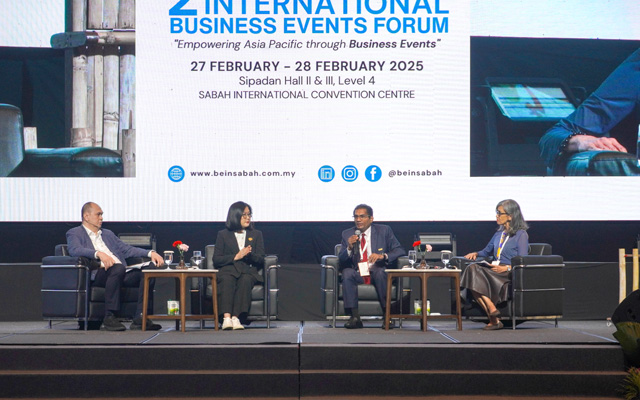Panellists at the recently concluded second International Business Events Forum – BE in SABAH 2025, comprising business events leaders from Malaysia, Thailand, and Indonesia, explored how subregional cooperation will help drive the expansion of the business events industry.
M Gandhi, president of the Malaysian Association of Convention and Exhibition Organisers & Suppliers (MACEOS), highlighted the immense potential for subregional collaboration, particularly within the BIMP-EAGA (Brunei, Indonesia, Malaysia, and the Philippines) economic corridor, during a panel session entitled Unlocking business events expansion opportunities in Asia Pacific: How can East ASEAN leverage to fuel APAC growth?.

He referred to this grouping as East ASEAN, home to approximately 81 million people, and described it as a promising business events cluster. With shared industry strengths, this subregion presents vast opportunities for industry-specific conferences and tradeshows, which could spur long-term economic development across its member countries.
Gandhi also emphasised the strategic advantage of cross-border collaboration between southern Thailand and Penang, noting that the travel distance between these two cities is shorter than from southern Thailand to Bangkok.
This, he argued, underscores the practicality and benefits of fostering deeper synergies between the neighbouring markets, positioning them as a regional business events hub. Subregional collaboration could also play a key role in developing homegrown events that capitalise on shared industry strengths and market demand, Gandhi added.
Nooch Homrossukhon, director of the Corporate Image & Communications Department at Thailand Convention and Exhibition Bureau (TCEB), also spoke extensively about the role of AI-driven solutions in shaping the future of business events.
She highlighted how TCEB’s MICE Intelligence and Innovation Department leverages cutting-edge technology, data analytics, and AI-powered insights to identify market trends, optimise event planning, and create a more dynamic and competitive business events landscape in Thailand.
To support industry stakeholders, TCEB also operates a MICE Intelligence and Resource Centre microsite, which provides insightful, actionable data to help businesses devise concrete strategies and navigate emerging market trends effectively.
Meanwhile, Hosea Andreas Runkat, chairman of the Indonesia Exhibition Companies Association, pointed to an uptick in Chinese exhibition organisers diversifying their event portfolios beyond China.
In this case, Indonesia’s large population of over 270 million and its rapidly growing economy, would make it a highly attractive market for Chinese organisers, said Andreas. This presents a valuable business opportunity for Indonesia’s business events stakeholders.





















